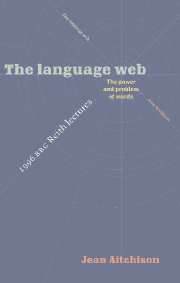5 - A world-wide web
Options and snares
Published online by Cambridge University Press: 05 June 2012
Summary
By degrees I made a discovery of still greater moment. I found that these people possessed a method of communicating their experience and feelings to one another by articulate sounds. I perceived that the words they spoke sometimes produced pleasure or pain, smiles or sadness, in the minds and countenances of the hearers. This was indeed a godlike science, and I ardently desired to become acquainted with it.
Mary Shelley Frankenstein (1818)We human beings are odd compared with our nearest animal relatives. We've lost most of our hair, we wear clothes, and according to the writer Mark Twain, we are the only animal who blushes, or who needs to. But our oddest characteristic is our language.
Unlike animals, we humans can say what we want, when we want. ‘Alfred burned the cakes’, ‘Amanda plans to breed bandicoots’ and ‘Mermecolions intrigue me’, are all possible utterances, even though Alfred burned the cakes over 1,000 years ago, Amanda's bandicoot-breeding plans are in the future, and mermecolions are mythical creatures, a cross between a lion and an ant with sex organs the wrong way round.
This open-endedness, the ability to talk about anything at any time is uniquely human. In contrast, many animals are limited in the signals they can send. One species of grasshopper selects between six possible chirps, meaning roughly: ‘Life is good’, ‘Get off my patch!’, ‘I'm feeling sexy’, ‘That female's mine!’, ‘How about making love?’ and finally, ‘I did enjoy that!’
- Type
- Chapter
- Information
- The Language WebThe Power and Problem of Words - The 1996 BBC Reith Lectures, pp. 79 - 96Publisher: Cambridge University PressPrint publication year: 1996



